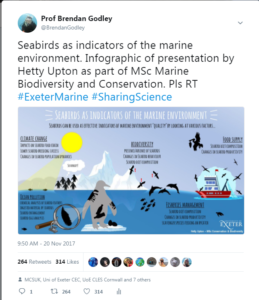Prof Brendan Godley teaches a MSc module on Marine Biodiversity and Conservation at the Centre for Ecology and Conservation on the University’s Penryn Campus. The students learn about a wide diversity of topics and undertake independent study on two major topics within their specific interests. These are assessed by a dissertation and an oral presentation to their peers, respectively. This year, the tutor challenged his students to go a stage further and produce an infographic to communicate the message of their oral presentation to a wide audience that could then be shared on Twitter or other social media platforms. Brendan wrote;
“Communicating science, especially conservation science, to a wide audience is a key skill we all need to work on. This was my initial reasoning for setting the task. I think. however, that the exercise really challenged the students to distil and clarify their key take-home messages in advance of giving their talks. They achieved both of these aims with some aplomb and were widely complimented on their work.”
The module sees a range of invited marine conservation practitioners sharing their sectoral experience with the students. Katrina Ryan of Mindfully Wired a consultancy which specialises in science communication was one of the invited experts this year and gave the students feedback on their infographics as part of her session. Katrina added;
“It’s wonderful to see vital communication skills being fostered as part of these students’ wider conservation science learning. Condensing such complex subject matters into compelling graphics is a real challenge, but the students did a superb job and, as a result, many had significant impact on social media”

Click her to see a storify of the tweets, starting with the single most impactful by Hetty Upton.
#ExeterMarine is a interdisciplinary group of marine related researchers with capabilities across the scientific, medical, engineering, humanities and social science fields. If you are interested in working with our researchers or students, contact Michael Hanley or visit our website!
